Page Table of Contents
About the Author
Hot Topics
Updated on Jan 29, 2026
Can you change cluster size without formatting? Yes. You can change cluster size without formatting by using a third-party partition manager tool like EaseUS Partition Master, which is designed to perform this operation without data loss. While Windows' built-in Disk Management can't change the cluster size without reformatting, this third-party tool can modify the cluster size on NTFS, FAT32, and exFAT file systems.
In this post, EaseUS Software offers a professional tool to change cluster size without losing data. Here is a real user case from Reddit:
changing Allocation Unit size
byu/EditorHelpful4263 inwindows
So why bother changing cluster size in the first place? It's not something most people think about until it starts causing problems. Cluster size (also called allocation unit size) affects how your disk stores data. If you deal with lots of small files, smaller clusters help save space. But if you're storing big files like 4K videos or large games, a larger cluster size can make your system run faster and smoother.
Sometimes, you don't really have a choice. When trying to extend a volume, you might see an error like "The volume cannot be extended because the number of clusters will exceed the maximum." (from r/DataHoarder) That's your system's way of saying the current cluster size is too small.
Share this post to help more users learn how to change cluster size without reformatting and which cluster size they should select.
Now that you understand when and why to change cluster size, let's go through the step-by-step guide to do it safely without formatting or losing data.
How to Change Cluster Size Without Formatting
Is it safe to change cluster size? This is the most significant concern for users. Disk Management and Diskpart can't change cluster size without formatting the disk, so they will cause data loss during the process. To change cluster size safely without data loss, you need use third-party software.
EaseUS Partition Master is an efficient software for changing cluster size without formatting or losing any data. It is a user-friendly and certified third-party disk management tool to manage partitions on hard drives. It offers an advanced "Change cluster feature" that is straightforward to navigate without any data loss. This software supports all Windows versions, and users with limited technical expertise can operate it.
- ✔️Change cluster size without data loss.
- ✔️Support Windows 11/10/8/7.
- ✔️Change cluster size on SD card, USB flash drive, external hard drives, SSDs, HDDs, etc.
- ✔️Support NTFS, exFAT, FAT32, ext2/3/4.
Step 1. Right-click the partition that you need to change its cluster size, select "Advanced" and click "Change Cluster Size".
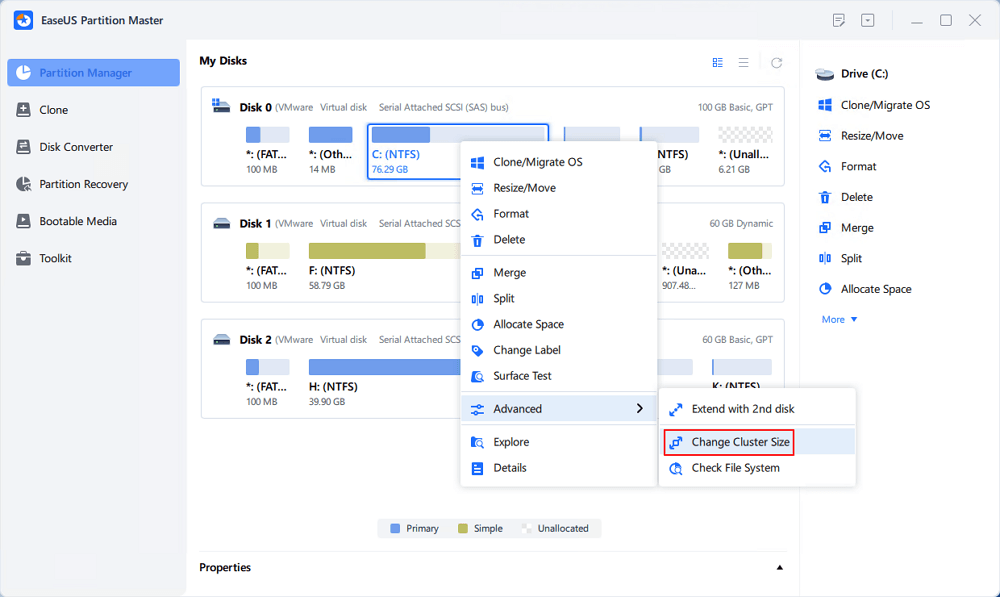
Step 2. Click the size list below the New size section, and select a desired cluster size you want to adjust for the disk partition, click "OK".
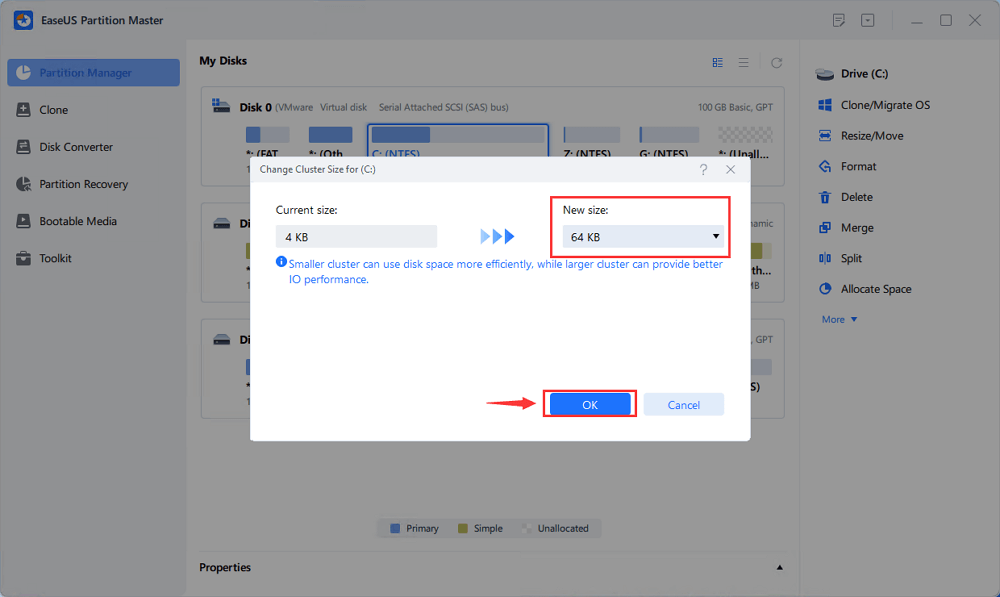
Step 3. Click "Execute 1 Task(s)" and click "Apply" to confirm the operation.
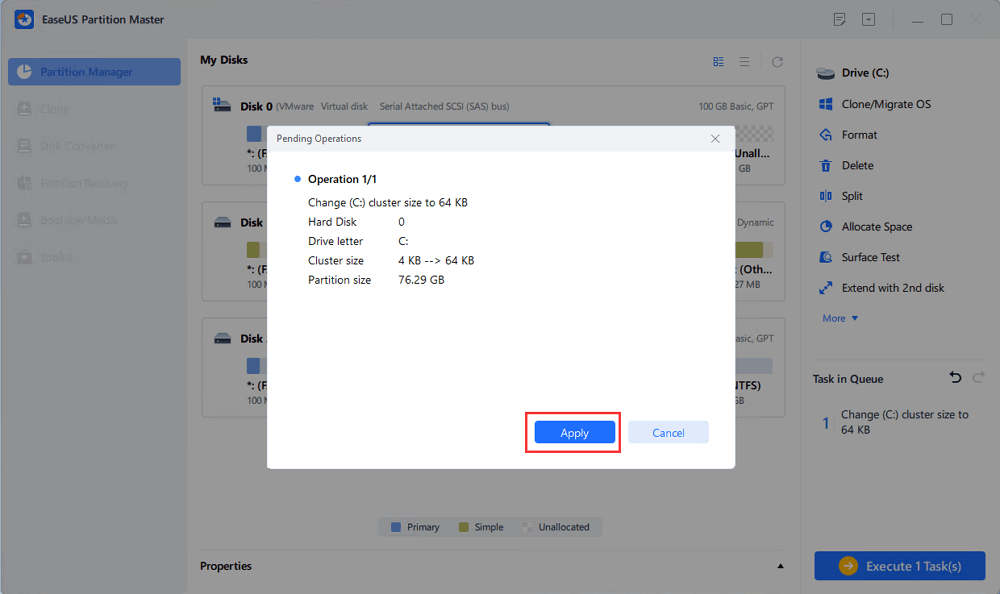
In addition, this tool offers a one-stop solution to meet your disk management needs without compromising your data integrity. It allows users to optimize their storage, including multiple added advantages. Any Windows user can painlessly navigate options to perform disk-related tasks. It offers versatility for different file systems, such as NTFS, FAT, exFAT, and others, expanding its market appeal. Moreover, the non-destructive operations of the software protect your essential data during the partitioning procedure.
Download EaseUS Partition Master to eliminate the need for tedious formatting processes and data backups. Its quick functionality saves users' efforts to get the job done in one click.
Key Features:
- Change Cluster Size: To improve storage efficiency without formatting, change the cluster size of SSDs or HDDs.
- Partition Resize/Move: Modify partition sizes and locations to meet your changing storage demands.
- Merge/Split Partition: Partitions can be combined or divided to improve data organization and space allocation.
- Convert File System: Without sacrificing data, convert files seamlessly across multiple file systems.
- Clone Disk/Partition: Move operating systems and data to new disks or storage areas.
Incorporate the trial version of EaseUS Partition Master into your Windows computer today to experience seamless partition and cluster management. This tool can do all without the need for a time-consuming formatting procedure.
Try it now to unlock the full potential of your storage drive and obtain a secure partitioning experience.
Why Change Cluster Size Without Formatting
Changing the cluster size without formatting provides the advantage of avoiding data risks. Windows offers built-in tools that only change the size after formatting. A data partition tool - EaseUS Partition Master, can increase or reduce the cluster size without data loss. This software is an efficient solution for those who don't want to dive into complex formatting procedures.
Here are the most common reasons why you should change cluster size without formatting:
- Data preservation: Prevents data loss when changing the cluster size.
- The efficiency of time: Quicker change without complete formatting.
- No data backup: There is no hassle of creating backups.
- Continuity: Maintains the structure and operation of the disk.
- Convenience: Changing cluster size without formatting creates incredible user convenience.
For other knowledge about allocation unit size, such as the best SSD cluster size, please check the following article:
What's The Best SSD Allocation Unit Size in Windows 11/10
On this page, we will introduce what is the best SSD allocation unit size in Windows 11/10. And you can also get the best solution to change it.
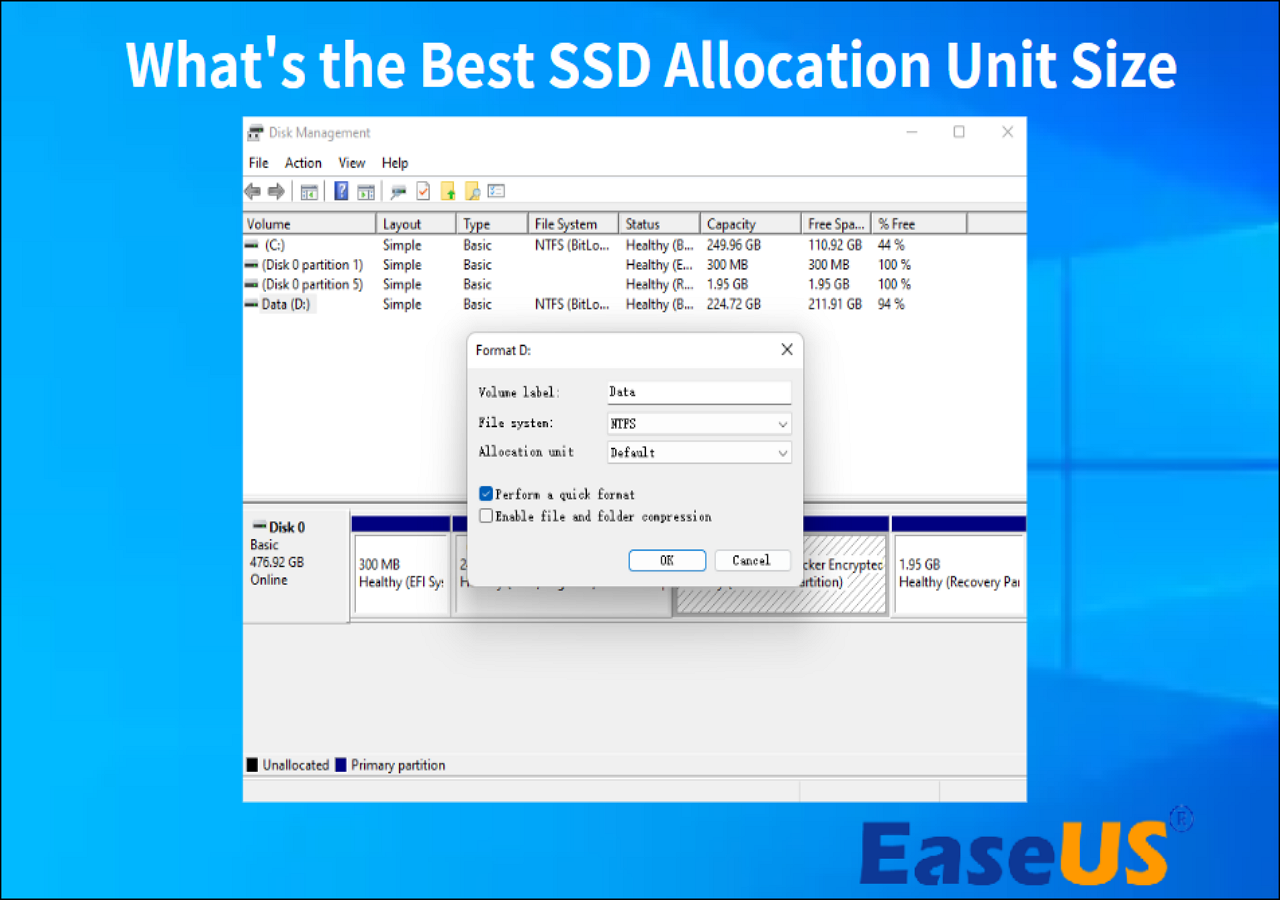
What Cluster Size Should I Use
There's no one-size-fits-all answer; the best cluster size depends on your file types, drive capacity, and how you use the disk. Whether you're formatting an SSD, HDD, USB drive, or SD card, selecting the correct allocation unit size can enhance both performance and storage efficiency.
Here's a quick breakdown for different use cases:
1️⃣4 KB (Default for NTFS drives)
- This is the recommended cluster size for Windows system drives and most SSDs or HDDs. It's perfect if you store lots of small files — documents, photos, program data, etc. A smaller cluster helps minimize wasted disk space and works well for daily computer use.
2️⃣8 KB - 16 KB
- A balanced option if you work with a mix of small and large files. This setting can improve read/write efficiency slightly without causing noticeable loss of space. It's a good choice for general-purpose partitions or external hard drives used for file backups.
3️⃣32 KB - 64 KB
- Best cluster size for gaming, video editing, and large media files. Bigger clusters reduce fragmentation and speed up access to large files, such as 4K videos, ISO images, and game data. However, if your drive contains many small files, you'll waste more disk space.
4️⃣128 KB or Higher (For specific workloads)
- Suitable for high-capacity exFAT drives or external storage mainly used for large backups, raw video footage, or virtual machines. Avoid using this on a boot drive or partitions with system files, as some older software and utilities may not recognize it properly.
💡 Note:
If you're dealing with a system partition or boot disk, stick with the default 4 KB NTFS cluster size. Changing it could cause compatibility issues with Windows updates, cloning software, or backup tools.
Read Also:
Conclusion
The article covered the possible techniques and tips to modify cluster sizes without formatting. We believe you have successfully changed the cluster size on your Windows PC. EaseUS Partition Master is the recommended partition tool to change cluster size without formatting. While Windows offers several built-in tools, it's crucial to note that they change the cluster size after formatting.
Please feel free to share the information with others if you find it useful.
Change Cluster Size Without Formatting FAQs
Formatting will erase everything from the drive. We talked about the way to change the allocation unit size without formatting the drive. Follow this FAQs section if you have further queries about the topic discussed on the page.
1. How to change block size from 4k to 64k without formatting?
Unfortunately, you cannot change the block/cluster size without formatting the drive. Cluster size is defined during the formatting process, and Windows does not support converting it directly. To change from 4K to 64K without data loss, you should turn to third-party software like EaseUS Partition Master.
2. How to change cluster size on SD card?
Changing the cluster size of an SD card also requires reformatting the card.
Here's how to do it safely:
First, back up all files from the SD card. Use File Explorer, Disk Management, or a third-party tool to reformat the SD card. Choose FAT32 or exFAT and select the desired allocation unit size, like 32K or 64K. Complete the format and copy your files back.
If the SD card is larger than 32 GB, Windows may not allow FAT32 by default, and you need to use specialized software instead.
3. How to format a drive to a 64K block size?
To format a drive with a 64K block (cluster) size, follow these steps:
- Open File Explorer.
- Right-click the drive and click Format.
- Select the file system (NTFS/FAT32/exFAT).
- Under Allocation Unit Size, choose 64 kilobytes.
- Click Start.
How Can We Help You
About the Author
Sherly joined EaseUS in 2022 and she has always loved writing articles and enjoys the fun they bring. She receives professional training here, focusing on product performance and other relative knowledge. She has written over 200 articles to help people overcome computing issues.
Product Reviews
-
I love that the changes you make with EaseUS Partition Master Free aren't immediately applied to the disks. It makes it way easier to play out what will happen after you've made all the changes. I also think the overall look and feel of EaseUS Partition Master Free makes whatever you're doing with your computer's partitions easy.
Read More -
Partition Master Free can Resize, Move, Merge, Migrate, and Copy disks or partitions; convert to local, change label, defragment, check and explore partition; and much more. A premium upgrade adds free tech support and the ability to resize dynamic volumes.
Read More -
It won't hot image your drives or align them, but since it's coupled with a partition manager, it allows you do perform many tasks at once, instead of just cloning drives. You can move partitions around, resize them, defragment, and more, along with the other tools you'd expect from a cloning tool.
Read More
Related Articles
-
Solved - File System Error (-2147219196) - Fix 2 Works Best🔥
![author icon]() Sherly/2026/01/29
Sherly/2026/01/29 -
How to Resize SD Card Partition in Windows 10 Quickly🔥
![author icon]() Cici/2026/01/29
Cici/2026/01/29 -
How to Hide System Reserved Partition in Windows 11/10/8/7 [Step-by-Step Guide]
![author icon]() Sherly/2026/01/29
Sherly/2026/01/29 -
SSD Health Check Software Free Download For Mac
![author icon]() Sherly/2026/01/29
Sherly/2026/01/29
Hot Topics
EaseUS Partition Master
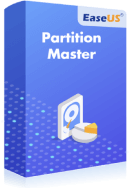
Version 20.0 is here - full exFAT support, easier disk partitioning, and PC performance optimization.









